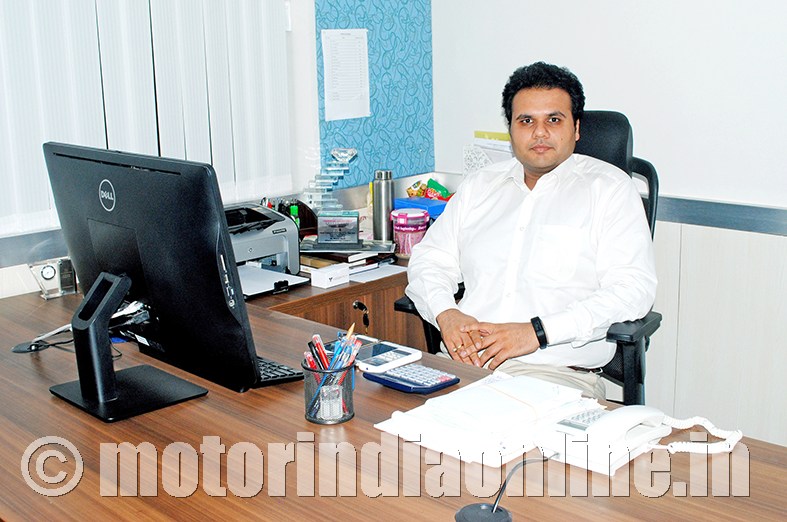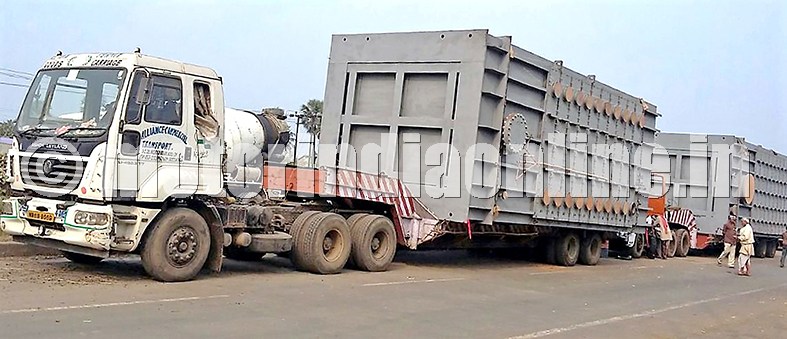The ACT Group has a history of more than 45 years since it began its operations in the transport industry. Alliance Commercial Transport (ACT) was founded in 2001 by Late Shri Kailash Chandra Agarwal whose persistence and pursuit of perfection in the Over Dimensional Cargo (ODC) transport segment and industrial project supply transportation was unmatchable. Following the sudden demise of Mr. Agarwal in January 2014, ACT operations were taken over by Mr. Nimish Saraf, elder son-in-law of Mr. Kailash Agarwal.

Despite not having any transport sector background, Mr. Saraf’s sound educational and industrial exposure was reflected in his dynamic leadership of the company, especially given it was not very easy to fill up the major void left by the veteran Mr. Agarwal. Mr. Saraf’s wife Mrs. Prerana Saraf, the elder daughter of Mr. Agarwal is actively supporting the growth of her father’s company as CFO of ACT.
Today, ACT has emerged one of the pioneers in the transportation of ODC, EPC Project Supply items (steel, fabricated structures, structural items, etc.), as well as heavy construction equipment. The company has a fleet of around twenty-five multi-axles, low-bed trailers and trucks as well as numerous heavy 100, 75, 40 & 14 MT cranes, German boom placer and approximately 50,000 sq. m. of scaffolding material (cup-lock, vertical system).
With its head office in Kolkata, ACT currently has 15 branch offices pan-India and runs vehicles on routes across the country in various segments including EPC projects, rail infrastructure, heavy engineering, solar, thermal, oil & gas refinery, building & construction, port, road infrastructure, etc.
We hear from Mr. Nimish Saraf, CEO, ACT, as to how the company has evolved over the years, the way forward and how the ‘Youth Transport Personality Award’ he received from Mahindra has put him and his company in the limelight more than ever before.
Excerpts:
FY17 performance highlights
Since 2014 there has been a major slowdown in the industrial capex which had affected the entire EPC and construction sector badly, though recovery signs have just begun to show. In FY17 we achieved stability in our operations and streamlined numerous processes which increased our operational efficiency. We also upgraded our IT infrastructure which helped us go digital in many ways. Financially, FY17 was still a lull period which continued from FY14 due to lack of new projects and crisis of funds in the market leading to delay in payments and increase in bad debts. However, the year helped us gear up for the future as the Youth Transport Personality Award from Mahindra gave us a strong push and confidence.
Plans and outlook for FY18
FY18 has begun on a good note with the market looking better, bidding for EPC projects by our clients is on the rise and execution of current projects is also catching pace with better cash flow cycles. There is a positive sentiment in the industry and we are geared to match up with the fresh business opportunities which are coming by in various sectors such as rail, road and port infrastructure.
‘Youth Transport Personality Award’
The Youth Transport Personality – National Runner-up Award at the Mahindra Transport Excellence Awards 2016 presented by Hon’ble Minister for Transport, Roadways & Shipping – Shri Nitin Gadkari Ji means a lot to me as it has not only instilled huge confidence in my own abilities but also provided a massive push to all our employees. The confidence level, determination to perform better, striving to work even harder and spirit of team work have all increased manifold. While we have been able to secure new businesses with major EPC, heavy engineering and rail infrastructure organizations, our relations with our existing vendors including CGTA (Calcutta Goods Transport Organization) and Chambers of Commerce have been further strengthened. The entire transport industry’s willingness to support the youth to perform and lead the nation from the front is evident from such initiatives for which I am extremely thankful to one and all.
GST impact on logistics sector
GST will be immensely beneficial to the logistics sector in the long term as the movement of goods across the states will become seamless with no inter-state check posts and ruling out operational inefficiencies. The ease of transportation will significantly improve and the benefits can be passed on to our clients by quicker deliveries and lesser hassles of immense paperwork pertaining to the various direct taxes. However, the short-term impact is that the service tax rate which was 15 per cent goes up to 18 per cent now under GST which will be an additional cost for our customers; but the bouquet of benefits GST will bring in will eventually lower the logistics costs for the industry.
Company’s GST-readiness
ACT has already obtained its provisional GST registration and has made suitable changes in its accounting software to become GST-ready. In order to leverage the benefits of GST, we have already implemented the hub and spoke model to improve the transportation dynamics and have acquired warehouse spaces in multiple locations.
Technology adoption
Fleet management solutions such as GPS tracking for vehicles are already being implemented and software for vehicle management has been customized as per the requirements. The emerging technology trends we see are ERP-based systems such as SAP and Oracle to be implemented in a full-fledged manner and connected to live tracking of vehicles with real-time notifications being sent to clients through various digital modes of communication.
Tackling driver shortage
Driver shortage continues to be a major challenge for the transport sector and to meet the same we must focus on the following:
* Driving a truck should become a respectable job for which awareness creation through national campaigns, transport awards, national circulating magazines honoring drivers and incentives from the government are important.
* Drivers should not be exploited and driving conditions should become better for them by providing double drivers on long trips. Vehicles older than 15 years should come off-road as they are not fit to be driven.
* Incentives such as awards for best drivers, educational support for drivers’ children, free health check-ups, etc., will provide them with a better sense of belongingness to the profession.
